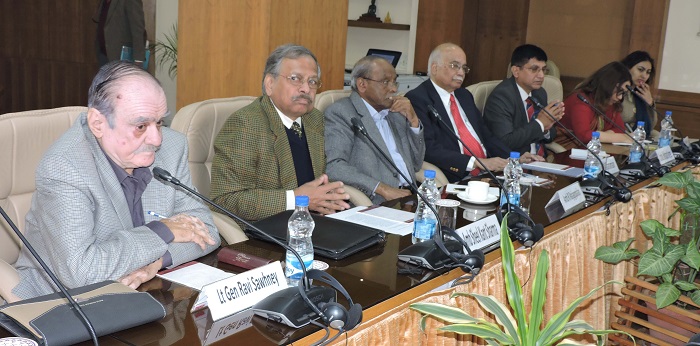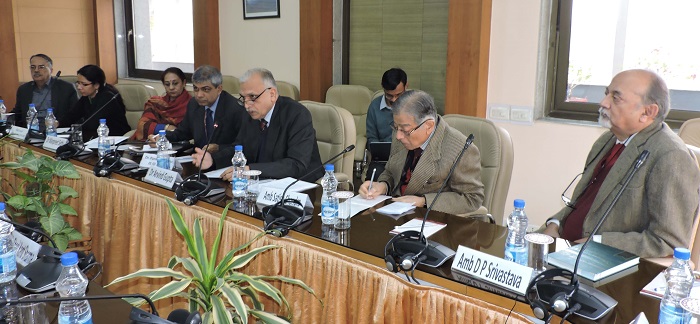

The Vivekananda International Foundation (VIF) organized a Round Table Discussion (RTD) on “India’s Nuclear Diplomacy” on 20 December 2017. Dr. Arvind Gupta, Director, VIF, moderated the session. The speakers of the round table included Amb. Satish Chandra, Amb. Sheel Kant Sharma, Amb. R. Rajagopalan, Amb. D. P. Srivastava, Prof. R. Rajaraman, Lt. Gen. Ravi Sawhney and Dr. Manpreet Sethi. At the end of the Roundtable, Dr. Pankaj Sharma, Joint Secretary, Disarmament and International Security Affairs (DISA), Ministry of External Affairs, gave his special remarks.

The round table discussed various challenges before India’s nuclear diplomacy in the wake of wide-ranging regional and international security developments. A number of issues such as North Korea’s relentless nuclear and missile provocations, lack of progress on US-Russia strategic arms reductions, Pakistan’s continuous stockpiling of fissile materials, and development of new long-range missiles like Shaheen and Ababeel for achieving MIRV capability were discussed. The RTD noted that in the wake of recently UN General Assembly adopted treaty on banning nuclear weapons, India should begin outreach with both nuclear weapons states and the non-aligned countries on issues of mutual significance, such as universal ‘no first use’ and nuclear weapons convention. India should also revive its campaign for global nuclear disarmament and lay down the roadmap for its implementation.

The participants unanimously agreed that it is in India’s interest to maintain the sanctity and primacy of the Conference on Disarmament (CD) as the right forum for discussion on disarmament and arms control issues. On Fissile Material Cut-off Treaty (FMCT), it was noted that India should play a constructive role in negotiations as per the Chenon Mandate. On the Country’s nuclear doctrine, it was suggested that the New Delhi should reiterate the credibility of the Doctrine by giving highest levels of assurances to both domestic and international audience. The assurance must be given from highest places such as the Indian Parliament. Also, the participants agreed that India need not develop Tactical Nuclear Weapons (TNW) in response to Pakistan’s TNWs; that the credible minimum deterrence posture must be upgraded technologically in view of developments in cyber and outer-space that affect that posture. Finally, India should review various technological developments from to time and develop both the ballistic missile defence as well as offensive weapons capabilities to strengthen its security posture.
Links:
[1] https://www.vifindia.org/event/report/2018/march/21/round-table-discussion-on-india-s-nuclear-diplomacy
[2] http://www.facebook.com/sharer.php?title=Round Table Discussion on India’s Nuclear Diplomacy&desc=&images=https://www.vifindia.org/sites/default/files/DSCN0525.JPG&u=https://www.vifindia.org/event/report/2018/march/21/round-table-discussion-on-india-s-nuclear-diplomacy
[3] http://twitter.com/share?text=Round Table Discussion on India’s Nuclear Diplomacy&url=https://www.vifindia.org/event/report/2018/march/21/round-table-discussion-on-india-s-nuclear-diplomacy&via=Azure Power
[4] whatsapp://send?text=https://www.vifindia.org/event/report/2018/march/21/round-table-discussion-on-india-s-nuclear-diplomacy